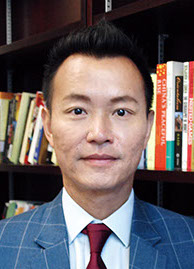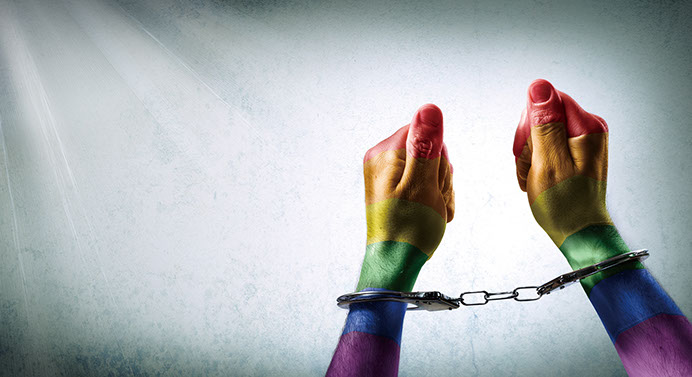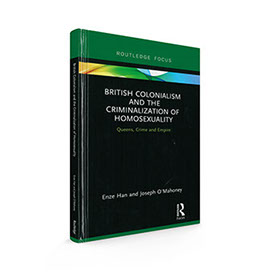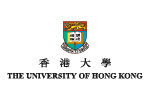During a meeting of Commonwealth heads of government this summer, British Prime Minister Theresa May urged Commonwealth nations to reform any anti-gay legislation still held over from colonial rule. She did not go so far as to apologise for the laws but said: “As the United Kingdom’s prime minister, I deeply regret both the fact that such laws were introduced and the legacy of discrimination, violence and death that persists today.”
The legislation to which she refers is the subject of British Colonialism and the Criminalization of Homosexuality, written by Dr Enze Han, from the Department of Politics and Public Administration, and Dr Joseph O’Mahoney, a lecturer at the University of Reading.
It assesses historical and current evidence from countries around the world and looks at the ways the British empire created laws criminalising homosexuality in its colonies. The book has case studies of common law and criminal codes including the Indian Penal Code of 1860 and the Queensland Criminal Code of 1899, and it looks at the politics and legal status of homosexuality across the globe today, asking whether British imperialism ‘poisoned’ societies against homosexuality.
The book came about because of widespread interest in an article Dr Han and Dr O’Mahoney published in the Cambridge Review of International Affairs in 2014 about a political science study on the relationship between colonial laws and contemporary laws on the decriminalisation of homosexuality.

![]() France had a large empire too, but anti-homosexual laws were abolished in the Napoleon Penal Code of 1804, while Britain, particularly during the ultra-conservative Victorian era, strengthened them. The law took on a life of its own in some countries.
France had a large empire too, but anti-homosexual laws were abolished in the Napoleon Penal Code of 1804, while Britain, particularly during the ultra-conservative Victorian era, strengthened them. The law took on a life of its own in some countries. ![]()
Dr Enze Han
Attracting attention
“It attracted a lot of attention, including from the Washington Post,” said Dr Han, who was a senior lecturer at SOAS University of London, at the time. “They asked us to write a piece for the Monkey Cage blog, a platform the paper describes as being for political scientists to ‘make some sense of the circus that is politics’. [The title comes from H L Mencken’s quote, “Democracy is the art of running the circus from the monkey cage.”]
“After that we got many responses discussing the subject, particularly from journalists and LGBT [lesbian, gay, bisexual and transgender] activists working in Africa. It also attracted the interest of Alexandra McGregor, who is editor of the ‘Sexuality and Gender Studies’ series at Routledge and who asked them to expand the articles into a short book.
In addition, they wrote a piece for The Conversation, a blog for academics and researchers, entitled ‘How Britain’s colonial legacy still affects LGBT politics around the world‘. It got 15,000 hits.
In that blog they mention May’s speech and the interesting events that followed it. Dr Han said: “Her words came in the aftermath of a court decision by Trinidad and Tobago to decriminalise homosexuality. The drama came later, when, during an interview with the BBC, Trinidad’s Anglican Bishop Vince Gill denounced the ruling and called May’s comments ‘neo-colonialism’. He missed the irony that it was British colonialism which outlawed homosexuality in the first place.
“As the book indicates, this is not the only instance of a country flipping the Western part and claiming that being anti-gay is part of their own culture and tradition and not down to the colonial influence.”
The two scholars’ interest in the subject dates back to 2012, when they were examining an ongoing study by the International Lesbian, Gay, Bisexual, Trans and Intersex Association (ILGA) tracking the legal situation for homosexuals in different countries. “We were fascinated as to why some countries have laws against homosexuality and some do not,” said Dr Han. “We were also interested by the diversity of the punishments – from the death penalty in some countries to a fine in others – and in what was actually considered illegal.”
“Obviously Britain was not the only colonial power,” he continued. “France had a large empire too, but anti-homosexual laws were abolished in the Napoleon Penal Code of 1804, while Britain, particularly during the ultra-conservative Victorian era, strengthened them. The law took on a life of its own in some countries.”
Of the 71 countries that still criminalise gay sex today, at least 37 of them were once subject to British colonialism. The book covers all of them and looks at the different ways the law was interpreted. “On the one hand we found the longevity of the institution,” said Dr Han, “but on the other we found that even in the strictest days of the colonies, the governor had discretion over the interpretation of the law and often would not enforce it.

Next
Back
Queen and Empire
British Colonialism and the Criminalization of Homosexuality examines whether colonial rule is responsible in many parts of the world for the historical, and continuing, criminalisation of same-sex relations.
British Colonialism and
the Criminalization of Homosexuality
Authors: Enze Han and Joseph O’Mahoney
Publisher: Routledge

“Over the past few decades there has been a trend to remove these laws, with the most recent former colonies to do so being Belize, Seychelles and Fiji. India, the jewel in the colonial crown, only decriminalised homosexuality in September, 2018.”
In Hong Kong homosexuality was against the law until 1990, 23 years after England decriminalised it.
Asked why the book’s subject has aroused such interest, Dr Han said: “The topic surprises most people – they didn’t realise there was a colonial aspect to homosexuality laws. In the UK, domestic issues such as Brexit have raised the spectre of empire and how it is remembered. It is a complex and political story.”
Home
November 2018
Volume 20
No. 1

